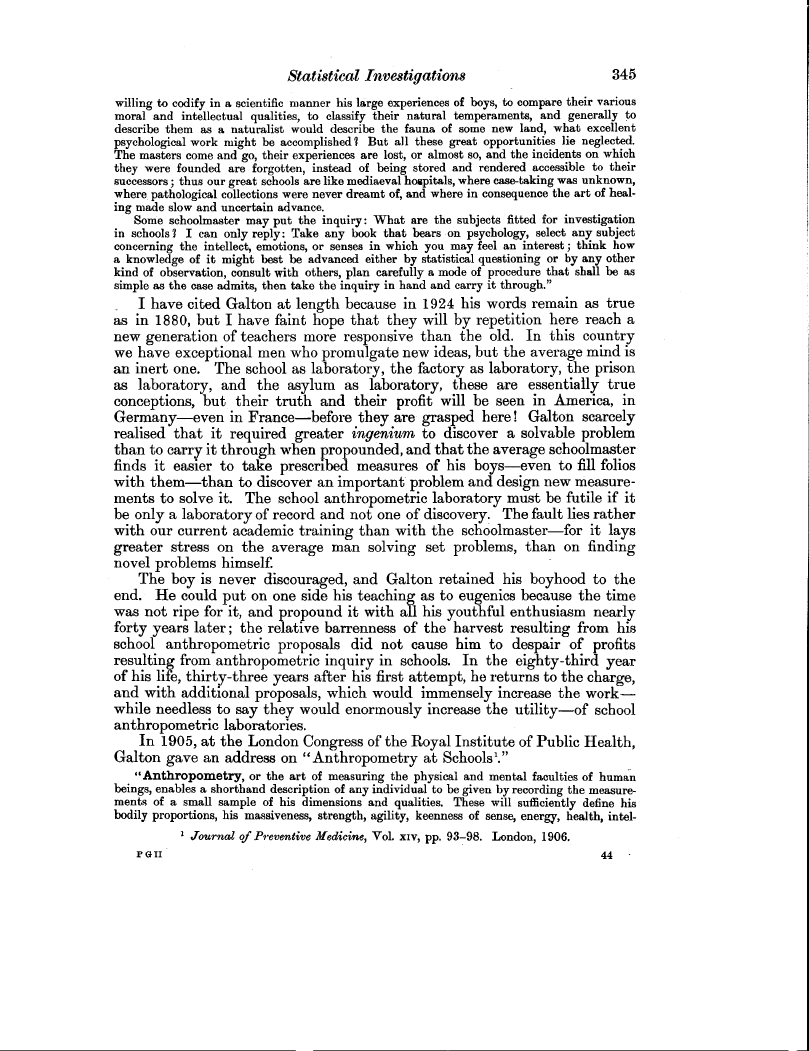Statistical Investigations 345
willing to codify in a scientific manner his large experiences of boys, to compare their various moral and intellectual qualities, to classify their natural temperaments, and generally to describe them as a naturalist would describe the fauna of some new land, what excellent psychological work might be accomplished I But all these great opportunities lie neglected. The masters come and go, their experiences are lost, or almost so, and the incidents on which they were founded are forgotten, instead of being stored and rendered accessible to their successors; thus our great schools are like mediaeval hospitals, where case-taking was unknown, where pathological collections were never dreamt of, and where in consequence the art of healing made slow and uncertain advance.
Some schoolmaster may put the inquiry: What are the subjects fitted for investigation in schools? I can only reply: Take any book that bears on psychology, select any subject concerning the intellect, emotions, or senses in which you may feel an interest ; think how a knowledge of it might best be advanced either by statistical questioning or by any other kind of observation, consult with others, plan carefully a mode of procedure that shall be as
simple as the case admits, then take the inquiry in hand and carry it through."
I have cited Galton at length because in 1924 his words remain as true as in 1880, but I have faint hope that they will by repetition here reach a new generation of teachers more responsive than the old. In this country we have exceptional men who promulgate new ideas, but the average mind is an inert one. The school as laboratory, the factory as laboratory, the prison as laboratory, and the asylum as laboratory, these are essentially true conceptions, but their truth and their profit will be seen in America, in Germany-even in France-before they are grasped here ! Galton scarcely realised that it required greater ingenium to discover a solvable problem than to carry it through when propounded, and that the average schoolmaster finds it easier to take prescribed measures of his boys-even to fill folios with them-than to discover an important problem and design new measurements to solve it. The school anthropometric laboratory must be futile if it be only a laboratory of record and not one of discovery. The fault lies rather with our current academic training than with the schoolmaster-for it lays greater stress on the average man solving set problems, than on finding novel problems himself.
The boy is never discouraged, and Galton retained his boyhood to the end. He could put on one side his teaching as to eugenics because the time was not ripe for it, and propound it with all his youthful enthusiasm nearly forty years later ; the relative barrenness of the harvest resulting from his school anthropometric proposals did not cause him to despair of profits resulting from anthropometric inquiry in schools. In the eighty-third year of his life, thirty-three years after his first attempt, he returns to the charge, and with additional proposals, which would immensely increase the workwhile needless to say they would enormously increase the utility-of school anthropometric laboratories.
In 1905, at the London Congress of the Royal Institute of Public Health, Galton gave an address on "Anthropometry at Schools'."
"Anthropometry, or the art of measuring the physical and mental faculties of human beings, enables a shorthand description of any individual to be given by recording the measurements of a small sample of his dimensions and qualities. These will sufficiently define his
bodily proportions, his massiveness, strength, agility, keenness of sense, energy, health, intel
Journal Journal of Preventive Medicine, Vol. xiv, pp. 93-98. London, 1906.
reII 44

